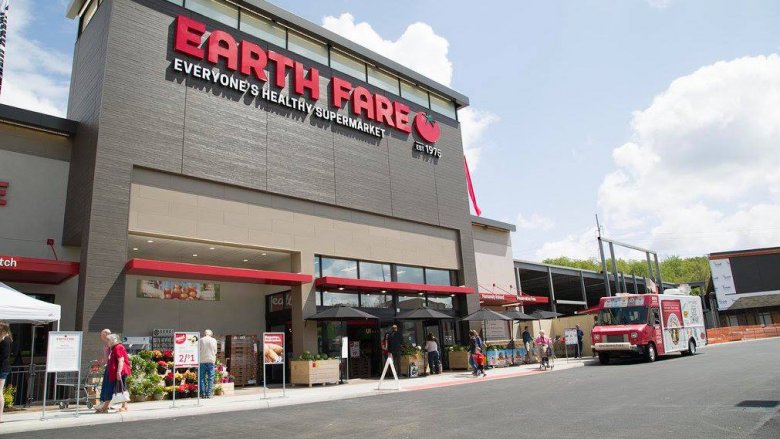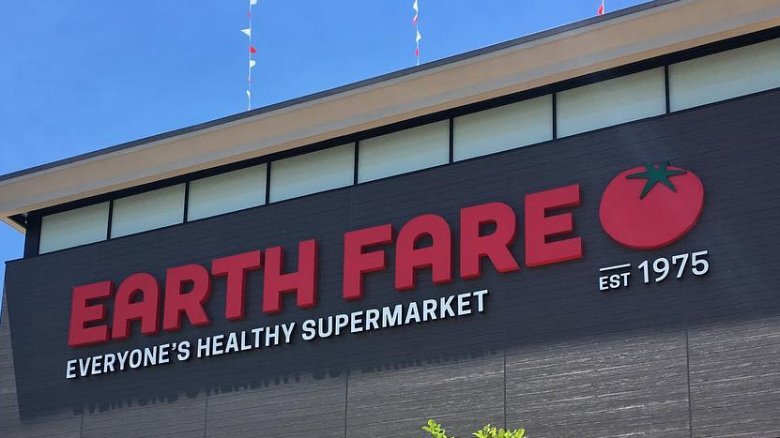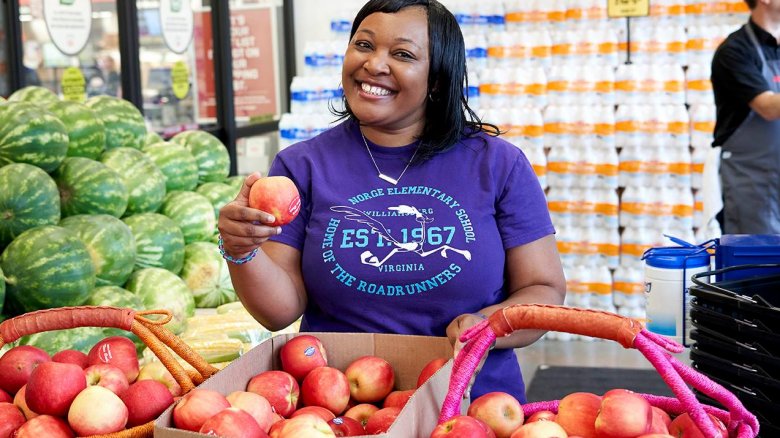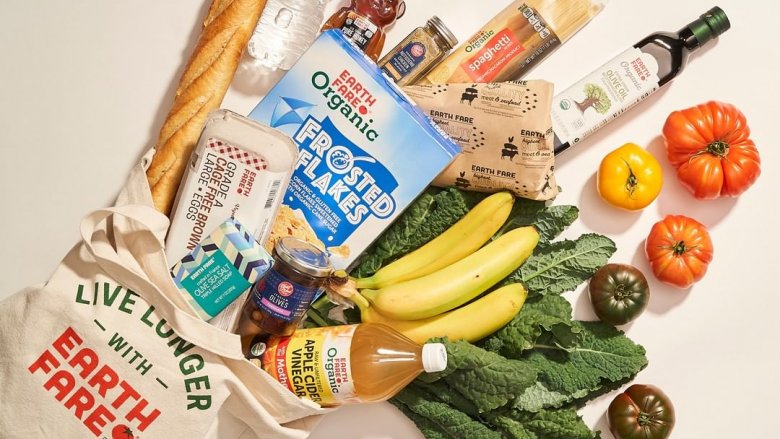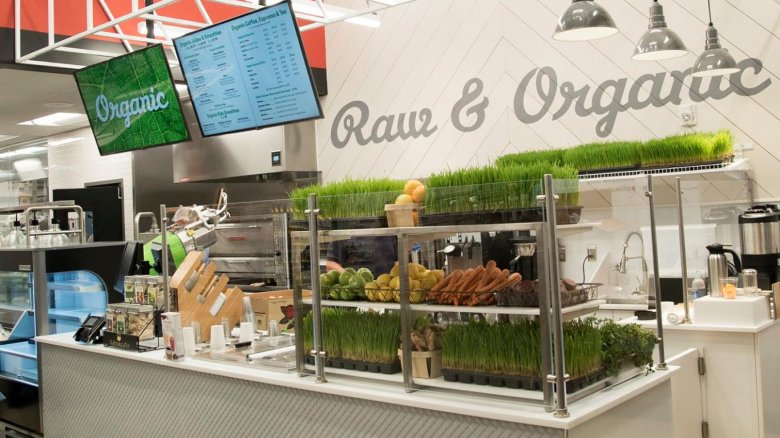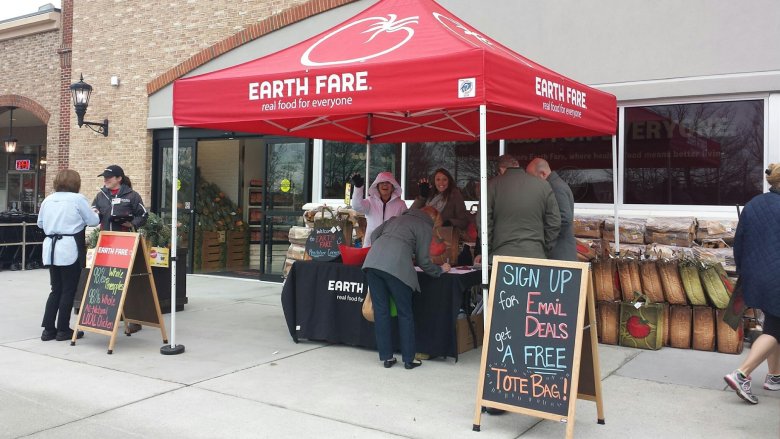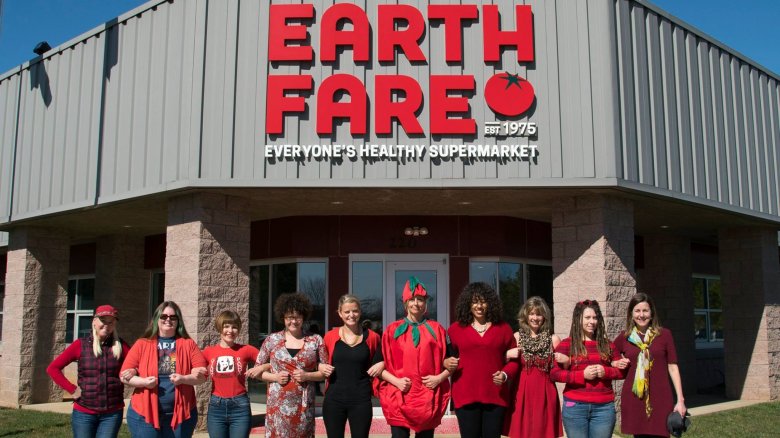The Untold Truth Of Earth Fare
If you live somewhere in the American Southeast or Midwest, you've probably seen an Earth Fare grocery store, even if you've never been inside one. Or maybe there's a brand new one slated to open near you and you're curious what it's all about. Much like Whole Foods, they specialize in organic and natural food, but what else do you really need to know about them?
There are lots of places to get your groceries these days, including near-countless options for having them delivered right to your door, and it's easier than ever to find natural and organic products even in stores that don't specialize in them. So what's the big deal about this specialty store? From their humble beginnings in the 1970s, to their commitment to offering the highest quality groceries at low prices, to their rapid expansion, and what's to come in the future, here's everything you didn't know about Earth Fare.
Earth Fare has been around for a long time
If an Earth Fare has just recently popped up in your neck of the woods, you'd be forgiven for thinking it's a brand new chain. Although Earth Fare is only somewhat recently hitting the mainstream, the company was founded in 1975. Back then they were called "Dinner for the Earth" and they were Asheville, North Carolina's very first health food store. These days, Asheville has several different kinds of health food stores, fresh markets, and co-op grocers (n fact, it's known as something as a destination spot for health enthusiasts), but it all started with that one store.
From 1975 until 1994, Dinner for the Earth operated just that single store in Asheville. In 1993, they changed their name to Earth Fare. According to company spokesperson Laurie Aker, "That was when they decided to join the growing movement to push natural and organic foods to the forefront of the American culinary experience." Their second store was opened in Charleston, South Carolina in 1997 and they've only continued to grow from there.
They claim the highest standards in the US
It can be hard to know what "natural" and "organic" food actually includes, made even more confusing by the fact that standards can vary. If you're wondering whether Earth Fare meets your standards of what natural means, you may appreciate that they claim to stick to the highest food quality standards in the industry. According to their Food Philosophy, their products are free from added hormones, antibiotics, artificial fats and trans-fats, high fructose corn syrup, artificial sweeteners and preservatives, bleached or bromated flour, and artificial colors and flavors.
It isn't just about what's in their food though, it's also about how their food comes into being. Take their meat, for instance, which in addition to having no antibiotics or growth hormones is never frozen and is certified humanely handled. Or their bakery items, which are homemade, including being kneaded and shaped by hand. It's easy to see why Earth Fare claims that its standards and commitment to healthy living are unparalleled.
They are super strict
It's all well and good that Earth Fare claims these high standards, but if food labels these days have taught us anything, it's that ingredients go by a ton of different names. To put it plainly, companies sneak all sorts of things into their products by using a variety of names. Luckily, Earth Fare is super strict about the ingredients in their products, maintaining a list of 140 ingredients, and counting, that they don't allow in. Their policy is "We read the labels so you don't have to" and their boot list is readily available. But good luck dissecting it.
Some excluded ingredients are easy to tease apart, like margarine, but ingredients like azodicarbonamide (used as a whitener in cereal flour and as a dough conditioner for bread) are a bit harder for the average person to know to look for. How does this list of banned ingredients stack up to Earth Fare's competitors? As of this writing, they ban more ingredients than Whole Foods and they were the first grocery store to ban high fructose corn syrup.
They put their money where their mouth is
We've already established that food companies can get a little creative with how they list their ingredients, so how can you know that Earth Fare has really captured everything on their banned ingredients list? According to their Vendor Policy Procedure, if you find one of those 140 banned ingredients on the label of a product on their shelf, you can get a $50 gift card and the product will be removed from the shelves.
The store also randomly checks some of their products and if unlisted banned ingredients are found, Earth Fare is committed to removing the product. Such was the case in 2008 when an independent lab found the preservative calcium propionate in a brand of bread, even though it was unlisted. In their newsletter at the time (via Progressive Grocer), Earth Fare shared, "We will no longer be carrying Sammi's Breads because of this, but will soon have alternate bakery products for you of suitable quality and integrity."
Their products are global and local
It's easy to find food from around the world these days. If you're looking for a specialty food item, you just have to venture to your favorite grocery store or visit one of the countless specialty grocery stores that are opening up in urban centers and rural towns alike. Earth Fare is no exception, carrying foods from all around the world.
But as much as people want access to products from afar, the benefits of eating locally sourced food, including supporting the local economy and getting more nutrients, are undeniable. While Earth Fare does offer global products, they've always prided themselves on their commitment to local products as well.
"When we say local, we really mean local," company spokesperson Laurie Aker told Asheville Lifestyle in 2016. That's especially true when it comes to Earth Fare's produce. The company is committed to selling as much produce as possible from within a 100 mile radius of their stores, meaning it's seasonal, fresh, and supports the local economy, wherever that may be.
They believe you can eat healthy for less
Making the transition to eating natural and organic foods can cause a bit of sticker shock. While eating healthy may not always be the least expensive option, it pays for itself in the long run. Still, many families struggle to afford healthy foods at some of the larger chain specialty stores. That's why one of Earth Fare's biggest commitments is helping families eat healthy for less.
To meet this goal, they launched a program called Clean Food Security to ensure "that every family can enjoy a delicious, Clean meal every night of the week for less than $2.50 per person (on average)." Through this initiative, a family of four would have an entire week's worth of dinners for $70. Not only is the food affordable, Earth Fare has focused on making it convenient, too. The Clean Food Security program goes with a calendar of pre-planned meals, and all the produce has been chopped and is ready to go. Think of it like Blue Apron on a budget!
They've changed hands
While Earth Fare started as a single store in North Carolina in the 1970s, they've expanded far beyond that concept. In 2007, the company was acquired by Monitor Clipper Partners, a private equity firm based in Massachusetts. Then, in 2012, Oak Hill Capital Partners acquired an 80 percent interest in the company, taking over primary ownership from Monitor Clipper.
While the average consumer might not take an interest in these kinds of acquisitions, author Wenonah Hauter pointed out in Foodopoly: The Battle Over the Future of Food and Farming in America that the interest private equity firms are taking in stores like Earth Fare shows just how profitable these natural and organic specialty stores have become. Hauter also points out that typically these types of million-dollar acquisitions (the Earth Fare acquisition was valued at $300 million) are made with expansion in mind. Clearly Earth Fare also got the memo, if their growth is any indication.
They're bigger than you think
Earth Fare may pretty much be limited to the Southeast and the Midwest, but don't assume that means they're a small company. According to Business Wire, they're one of the largest natural and organic food retailers in the United States. As of this writing, Earth Fare has 49 stores across ten states: Alabama, Florida, Georgia, Indiana, Michigan, North Carolina, Ohio, South Carolina, Tennessee, and Virginia, with four additional stores listed as "coming soon" on their site.
While this is just a fraction of the number of stores Whole Foods has in the United States, it's important to remember that Earth Fare doesn't have the Amazon advantage that Whole Foods has, nor are they in as many states — yet. Still, Earth Fare's rapid expansion can't be ignored. From just 13 stores in 2007 to nearly 50 just over a decade later, Earth Fare is clearly still growing.
Earth Fare CEO Frank Scorpiniti told the Asheville Citizen Times in 2016, "Going national is a future possibility, but at this time we are focused on expanding in our key states." He added, "Earth Fare is building a team that will help us double the size of our company and bring healthy options to more communities soon."
They've had some bumps in the road
As virtually any businessperson might tell you, growth is not linear. No matter the type of company, it's impossible for every product, location, or endeavor to be a hit. Earth Fare has learned this first hand with the closing of some of their locations in the past few years.
In 2016, Earth Fare closed stores in Kentucky, Ohio, and Alabama. In statements about the closings, Earth Fare cited real estate as the issue, noting in each statement, "the store's physical location has proven too much to overcome." Similar real estate related issues were cited in 2018 with the closing of two stores in Atlanta, Georgia and one closing in Ohio. In a press release, Earth Fare once again shared, "Despite the hard work of our team members, the real estate challenges associated with these locations have proven too difficult to overcome."
Luckily it appears that these closings are no more than bumps in the road for the grocer as more stores are slated to open in North Carolina and Florida in 2019.
Employees are feeling the pressure
When companies expand, it's usually the employees who feel the effects first. Earth Fare is no different. With a focus on expanding its stores and cutting costs to help increase profits, some employees have expressed concern that the commitment to employees has shifted. Former employee Christian Kerwin told the Asheville Citizen Times in 2016, "There's definitely been a major change in that it's very, very obvious what the new regime cares about, and it's not people — it's profits."
Though employees cited too few employees for the amount of work and inadequate compensation as problems, Earth Fare CEO Frank Scorpiniti told the Citizen Times that employee compensation, "is benchmarked against industry data, and additionally, all team members enjoy a significant purchase discount." He added, "Team members receive increases on a regular basis and receive increases when responsibilities increase."
Time will tell how Earth Fare employees feel about their work environment as the company continues to expand into new markets.
